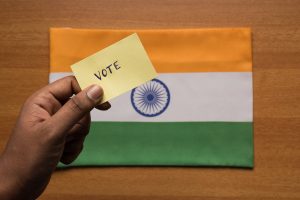Picture this scene: With general elections looming, the leader of the main opposition party is unseated from Parliament, and 146 members of Parliament find themselves suspended for daring to question the government. The bank account of the main opposition party is frozen. Federal agencies incarcerate two sitting chief ministers from opposition parties under draconian money laundering laws – a first in the history of independent India. Their bail is denied by courts. The ruling party has amassed roughly $1 billion through secretive electoral bonds. A sitting high court judge abandons allegiance to the independence of the judiciary and resigns to join the ruling party. To make matters worse, journalists critical of the government face routine investigation and arrest. Opposition parties face a hostile television media largely beholden to oligarchs and corporate interests.
This political scene is not unfolding in Russia, Belarus, Turkey, China, Cambodia, or Pakistan. This is happening in the world’s largest democracy: India.
For approximately a year now, Indian Prime Minister Narendra Modi has consistently extolled India as the “mother of democracy” across various world platforms, including a large-scale campaign during the G-20 summit held in New Delhi last September. However, behind these lofty proclamations lies a darker reality.
His administration’s alleged crackdown on dissenting voices paints a different picture – one characterized by authoritarian overtones and curtailment of fundamental freedoms. His Bharatiya Janata Party (BJP) has been accused of orchestrating horse trading, manipulating political parties, and leveraging federal agencies to coerce opposition lawmakers and engineer changes in governments across several states.
This maneuvering has led to the fragmentation of three political parties, with factions supported by the BJP gaining control of their election symbols and resources.
These actions undermine the integrity of the electoral process and distort the popular mandates conferred by elections. Such manipulations have sadly become normalized within Indian politics, with little to no resistance from state institutions, the judiciary, or public protests. Even during the election period, when the model code of conduct is in effect, opposition leaders characteristically face summons from federal agencies like the Central Bureau of Investigation and the Enforcement Directorate.
This situation creates a scenario of unequal and disproportionate election process, tilted in favor of the ruling BJP and far removed from the ideal of a “level playing field” repeatedly emphasized by the chief election commissioner in his addresses. The blatant disregard for democratic norms and the unchecked abuse of power erodes public trust in the electoral process and undermines the very foundations of democracy in India.
Amid these growing concerns about the fairness of elections, three key issues have emerged as particularly significant. These issues demand urgent attention from both domestic and international stakeholders to safeguard the integrity of India’s democratic process.
The first critical issue is the freezing of bank accounts belonging to the main opposition party, the Congress, by federal agencies. This action severely dents the financial resources of the opposition party and makes it difficult for them to conduct political campaigning and further corroding their ability to compete on a level playing field.
Adding insult to injury, the BJP seemingly will face no consequences for reaping a financial windfall under a secretive electoral bond scheme, since ruled unconstitutional by the Supreme Court.
Second, the arrest and raids targeting key opposition leaders aggravate concerns. Such actions suppress dissenting voices and create an atmosphere of fear and intimidation. They effectively hinder the opposition’s ability to participate in democratic processes.
Third, the Election Commission’s lack of impartiality and unresponsiveness to complaints of election violations by members of the ruling party, including the prime minister and home minister, raise serious doubts about its credibility. The commission’s failure to address concerns regarding the use of Electronic Voting Machines (EVMs) and its refusal to implement Voter Verified Paper Audit Trails (VVPATs) alongside EVMs to ensure transparency in the electoral process further undercuts public trust.
Moreover, the manner in which the Modi government circumvented the Supreme Court’s verdict on the appointment of election commissioners by changing the selection panel composition to favor the ruling party highlights systemic attempts to consolidate power and influence within the electoral commission. In contrast to the court’s directive – which included the prime minister, the chief justice, and the leader of the opposition in the selection panel – Modi’s new law includes the prime minister, a cabinet minister chosen by the prime minister, and the leader of the opposition. This alteration of the appointment process damages the independence of the commission and breeds doubts about its ability to function impartially.
To compound matters, the recent resignation of election commissioner Arun Goel under undisclosed circumstances, followed by the appointment of two hand-picked commissioners, only deepens anxieties about the commission’s transparency.
If India is to continue to hold its reputation as a democratic country, it is incumbent upon constitutional bodies – the Election Commission, the courts, and the prime minister himself – to protect the democratic heritage of this great nation. But if the trends in the last decade of Modi’s rule tell us anything, it is that his lust for power has grown manifold and has no constitutional morality.
The opposition, though with its hands and legs tied, needs to fend for itself. It needs to confront a powerful election machinery unprecedented in India's history, not solely to win back power, but to preserve the principles of democracy on which this country rests.
































